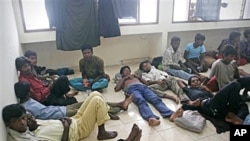A leading human rights group says up to 10 boats carrying Rohingya refugees have set sail from Bangladesh over recent weeks, hoping to reach countries in Southeast Asia.
Thousands of Rohingya from Burma’s Arakan state and Bangladesh flee each year to escape persecution in Burma and poverty in Bangladesh.
More than 25,000 Rohingya live in Bangladesh in camps supervised by the United Nations High Commission for Refugees.
But 200,000 more live in squalid conditions outside the camps without aid. Nearby, in Burma’s Arakan state, rights groups say the Rohingya, a Muslim community, face the threat of abuse by Burma’s military.
After the monsoons season each year, many Rohingya pay people smugglers to take them by boat to Southeast Asia, where they hope to find better lives.
This year is no exception.
Human Rights Watch says up to 10 vessels have set sail. This week, Indonesian marine police rescued about 129 Rohingyas who had been adrift for several days after their boat’s engine died.
Phil Robertson, Human Rights Watch’s Asia Division deputy director, says at least three boats have landed in southern Thailand, carrying more than 220 people.
"Refugees that reach Thailand’s shores should be received and taken care of. There are big concerns also I would add that there are other boats still out there and so it’s unclear if the Thai Navy for instance intercepts another boat, what are they going to do with it? We’ve been told that between nine to 10 boats left Bangladesh," Robertson said.
In the past, the Thai navy has been criticized for forcing Rohingya vessels back to sea.
Indian authorities last week rescued 91 Rohingya in the Andaman Sea; several were reported to be starving and dehydrated. The refugees claimed they had been sent back out to sea by the Thai navy. Human Rights Watch says its research supports their claim.
But Thai officials have told the United Nations that the Rohingya have not been mistreated. The Thai Foreign Ministry says the Rohingyas claimed they were Burmese and Thai officials deported them at a border crossing in Ranong province. The ministry said it did not know how the group traveled after leaving Thai territory.
Thai immigration authorities are holding 135 Rohingya, including some children, who landed aboard two vessels on the southern coast.
The Lawyers Council of Thailand says the Rohingyas’ legal rights need to be recognized and they should not be sent back automatically. Surapong Kongchantuk, chairman of the council’s subcommittee on ethnic minorities and migrant workers, says their cases should go through the judicial process.
Surapong says immigration officers are breaching the law in forcing migrants back. He says if they have entered Thailand illegally, immigration officers are required to take proper steps by contacting the country of origin, such as Bangladesh.
The Association of Southeast Asian Nations has established the Bali process, a mechanism for regional countries to address human trafficking and smuggling. But rights groups say the process has made no progress in easing the plight of groups such as the Rohingya.
Rights Group: Rohingya Refugees Taking to the Seas




